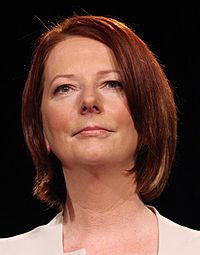Gillard government | |
|---|---|
 | |
| In office | |
| 24 June 2010 – 27 June 2013 | |
| Monarch | Elizabeth II |
| Governor-General | Dame Quentin Bryce |
| Prime Minister | Julia Gillard |
| Deputy | Wayne Swan |
| Party | Labor |
| Status | Majority (to Aug. 2010) Minority (from Aug. 2010) |
| Origin | Gillard wins 2010 Labor leadership spill |
| Demise | Gillard loses 2013 Labor leadership spill |
| Predecessor | Rudd government (I) |
| Successor | Rudd government (II) |
The Gillard government was the Government of Australia led by the 27th prime minister of Australia, Julia Gillard, of the Australian Labor Party. The Gillard government succeeded the first Rudd government by way of the Labor Party leadership spill, and began on 24 June 2010, with Gillard sworn in as prime minister by the governor-general of Australia, Quentin Bryce. The Gillard government ended when Kevin Rudd won back the leadership of the Australian Labor Party on 26 June 2013 and commenced the second Rudd government.
Before mounting her successful 2010 challenge to Rudd's leadership, Gillard had served as Deputy Prime Minister in the first Rudd government. With Treasurer Wayne Swan as her Deputy, Gillard went on to lead her party to the 2010 Australian federal election against the Liberal-National Coalition led by Tony Abbott. The election resulted in a hung Parliament in which Gillard secured the support of the Australian Greens and three independents to form a government. Leadership challenges occurred intermittently between Gillard and Rudd resulting in Labor leadership spills in February 2012, March 2013 and June 2013, the last of which ended her prime ministership.
Major policy initiatives of the Gillard government included, the Clean Energy Bill 2011, asylum seeker policy, Mineral Resource Rent Tax, National Broadband Network, schools funding following the Gonski Review and the National Disability Insurance Scheme.
Management of the Labor Party's alliances with the Greens and Independents were an ongoing issue following the 2010 election. In late 2011, the government secured the defection of a Liberal member Peter Slipper to serve as Speaker of the House of Representatives. Slipper resigned as speaker in October. In early 2012 the government lost the support of independent Andrew Wilkie. In May 2012 it suspended backbencher Craig Thomson from the ALP as evidence mounted that he had defrauded the Health Services Union. The Greens ended their formal alliance with Labor in February 2013 over taxation policy, but continued to offer confidence and supply.[1]
- ^ Packham, Ben (19 February 2013). "Greens say minority government agreement with Labor is effectively over". The Australian. Retrieved 19 February 2013.

